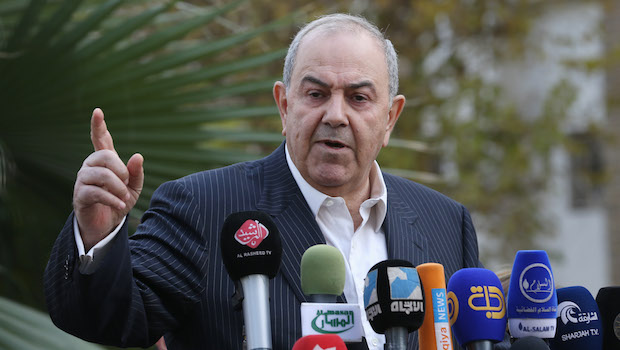
Iyad Allawi, the leader of Iraq’s main Sunni-backed Iraqiya bloc, speaks to reporters a day after Iraqi troops detained Sunni lawmaker Ahmad Al-Alwani in Baghdad, Iraq, on December 29, 2013. (AP Photo/Hadi Mizban)
Baghdad, Asharq Al-Awsat—Former Iraqi Prime Minister Iyad Allawi affirmed that the Iraqi parliamentary elections may not be held on April 30 as scheduled in light of the recent developments in the country.
A series of bombings targeted commercial infrastructure and security forces in Baghdad and its environs on Tuesday, killing at least 12 people. Car bombs were also reported in the holy city of Karbala, sacred to Shi’ites, and the southern town of Hafriyah, killing at least four others as the security situation across Iraq continues to deteriorate.
In a speech to a youth organization affiliated to his National Iraqi Alliance on Tuesday, Allawi expressed doubts about the integrity and transparency of the forthcoming elections.
Citing reports by the Independent Higher Elections Commission that forged electronic voting cards were being sold in Iraq, Allawi questioned the integrity and legitimacy of the forthcoming elections, adding that the Nuri Al-Maliki government should have revealed these problems sooner.
Allawi affirmed that the exclusion of a number of candidates from the election and the deteriorating security situation in Iraq are also threatening the forthcoming political elections. A number of serving and former Iraqi parliamentarians have been excluded from the elections, including former finance minister Rafie Al-Issawi.
He added that security breaches had become a daily occurrence, and that “effecting change and saving the country from disaster were now in the hands of Iraqi youth, not the politicians.”
“The Iraqi people have little desire to go to the elections because the only thing that has resulted from previous elections is discriminatory policies. The people have been met with exclusion and sectarian division,” Allawi said.
He warned that “the policies of oppression and marginalization are now in full swing through the exclusion of MPs from the elections.”
Parliamentary Speaker Osama Al-Nujaifi, head of the Sunni-majority Mutahidoun bloc, warned that “the exclusion of a number of prominent figures from participation in the political process, including Rafie Al-Issawi, had left a negative effect on the elections and sent a dreadful message to the partners in the political process.”
Thw two candidates who were excluded by the elections commission—leader of the Ummah Party, Mithal Al-Alusi, and Iyad Al-Jubouri—were reinstated by the Judiciary Commission following an appeal.
Alusi told Asharq Al-Awsat: “The Judiciary Commission’s decision to reinstate my candidacy has demonstrated that some of the decisions of the Independent Higher Elections Commission had political motives.”
He revealed that the person who originally made the complaint that led to his exclusion was a member of Maliki’s own Al-Dawa Party, praising the judiciary for its “fair and just” decision.
MP Izzat Shahbandar, leader of the Awfiaa Al-Watan Alliance, informed Asharq Al-Awsat: “The issue of exclusions was related to the Higher Elections Commission, which should have applied reasonable standards to its decision,” adding “the judicial decisions to reinstate excluded candidates from different movements and alliances clearly shows that the judiciary is a fair body.”
